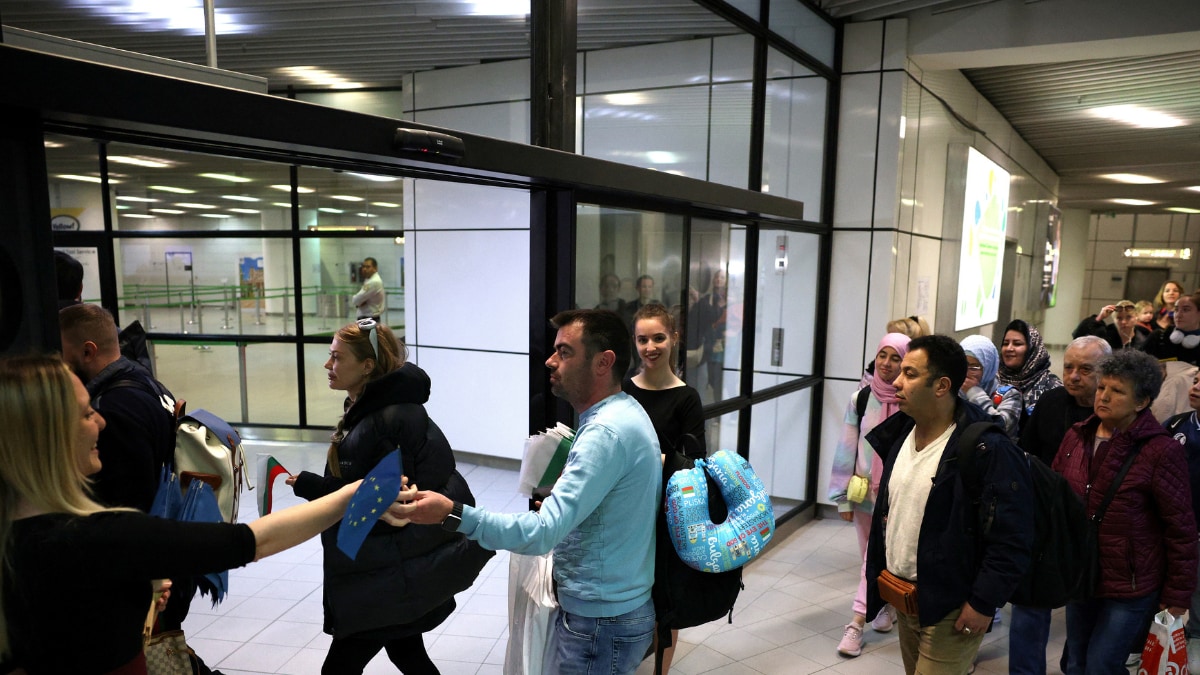[ad_1]
Last Updated:

Passengers arriving by a flight from Berlin receive European Union and Bulgarian flags during a ceremony marking Bulgaria’s joining of Europe’s open-borders Schengen area by air and sea, at Sofia airport, Bulgaria, March 31, 2024. (Reuters)
Germany faces a critical labor shortage, impacting its economic growth. Leveraging international student talent, particularly from India, could offer solutions
With a critical labour shortage coupled with an aging population, Germany is facing a major demographic challenge. Projections suggest a daunting deficit of seven million skilled workers by 2035, according to Deutsche Welle (DW).
Some 700,000 job vacancies remain unfilled, greatly impacting the nation’s economic growth trajectory. German Economy Minister Robert Habeck has sounded the alarm, underlining the pivotal role of migration in bridging this widening gap. One potential avenue for addressing this shortfall lies in engaging Germany’s Indian student population.
Currently, around 43,000 Indian students are enrolled in German universities, constituting about 14% of the student body. According to DW, these international students are often viewed as “ideal immigrants” due to their familiarity with the country and its language. However, they encounter particular challenges, including navigating the German education system and overcoming language barriers.
To leverage this demographic as part of the solution, Germany has enacted the Skilled Immigration Act, permitting international students to work up to 20 hours per week. This move aims to not only attract skilled individuals but also to cultivate a pipeline of talent for the workforce. Among these students, those pursuing degrees in information technology (IT) and engineering are especially crucial. Their expertise is in high demand, with shortages particularly acute in these sectors.
Despite the Skilled Immigration Act’s provisions, obstacles remain, including complexities within the German education system and uncertainties regarding legal processes post-graduation. Professor Enzo Weber, an employment research specialist at the University of Regensburg, said the law’s effectiveness hinges on factors like digitalisation and practical integration. “The law’s effectiveness depends on factors like digitalisation and practical integration support,” he was quoted as saying by DW.
Adding to that is the demographic landscape of Germany, which compounds these challenges. With a birth rate of only 1.4, Germany faces a shrinking cohort, exacerbating the urgency of attracting and retaining skilled individuals. In the face of these demographic shifts, the influx of international talent becomes not just desirable but indispensable for sustaining competitiveness. Professor Weber stresses the critical need to overcome policy hurdles.
Learning from countries like Canada, which have implemented proactive measures to facilitate the transition of international students into the workforce, Weber suggests Germany must streamline processes and offer clarity on immigration laws. Addressing legal formalities effectively and providing clear communication channels are imperative steps toward fostering a conducive environment for international talent retention.
[ad_2]
Source link




